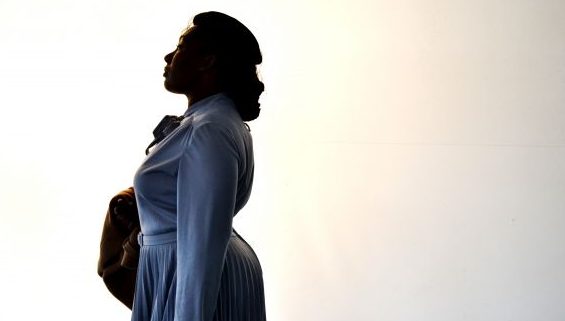Eden Court’s audience is encouraged to enter the Onetouch early tonight for the performance of Gazebo Theatre’s exploration of racism and migration. The stage, dimly lit and strewn with seemingly random items and artefacts is periodically doused by the smoke machine, and provides an odd backdrop to an eclectic mix of music. Pre-show housekeeping out of the way, the house lights dim only towards the end of the opening track of Shirley Bassey’s History Repeating.
The two characters, Cain and Simone, played by Tonia Daley Campbell and Oraine Johnson, stumble onto the stage as if fleeing from an attack at a black rights protest march. Trapped in a room of books, suitcases and stories, the two are drawn into a series of flashbacks visiting historical events and figures, beginning with slave trade revolts and visiting such diverse black figures as Mary Seacole, Walter Tull, Black Panther Obi Egbuna and Queen Nanny of the Maroons. These serve to highlight the suffering of black communities at the hands of their oppressors throughout the centuries. The play, written and directed by Pamela Cole Hudson, is billed as “a journey of discovery, reflection and tragedy” promising to “bring the events of hundreds of years gone before bang up to date.”
There is doubtless energy in the movement sequences, although the delivery of the dialogue feels a little overwrought at times. Unsurprisingly in the light of black history, the whole experience is unremittingly bleak (expect a lot of crying, panting, shouting and all manner of sounds of distress), although there is courage and defiance in the face of adversity too. Gazebo Theatre work predominantly in schools, and this explains the lecture-feel: extended dialogue (which does not feel natural for the characters), packed with dates, names, contexts and political agendas. The purpose is clearly to educate, but it is a challenge to do so without feeling schooly. The dialogue could be tighter, and the over-reliance on sound effects made the lack of proper fade in/ fade out more noticeable. The present day plot does make sense once the ending is revealed, but throughout, the play feels like an episodic list, suggesting that nothing has changed at all. This seems a little simplistic, but may well be the starting point of what Gazebo seeks to do: they want Sorry! No Coloureds, No Irish, No Dogs to be “eye opening”, “thought provoking” and to “stimulate discussion”.
There is much to commend: a stunning a capella song, later accompanied by atmospheric drumming; Dance and movement elements which work; and above all, the tour de force of a very wordy script, carried by two committed actors for a full 90 minutes.
It was perhaps disappointing that the “them and us” rhetoric persisted till the end, where there was an opportunity to show that there can be an us and us.
